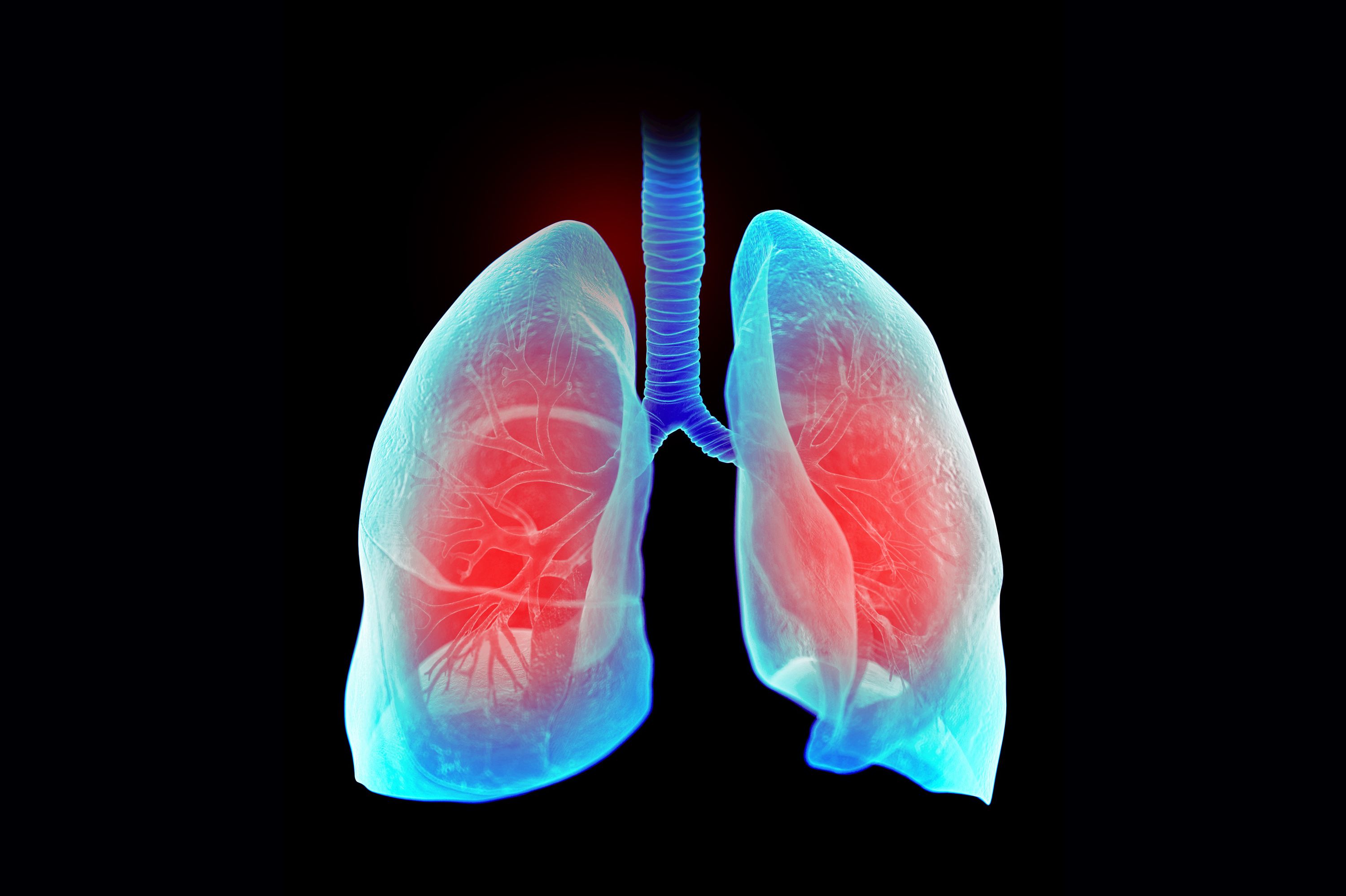

Featured
How To Improve Lung Health
Published: September 14, 2023
Learn effective tips and techniques to enhance your lung health from our featured guide, ensuring you breathe better and maintain optimal respiratory function.
Introduction
Welcome to the comprehensive guide on how to improve lung health! Your lungs play a vital role in your overall well-being, as they are responsible for delivering oxygen to the bloodstream and removing carbon dioxide from the body.
Keeping your lungs healthy is essential to maintain your respiratory system and ensure optimal functioning. However, factors such as smoking, pollution, and exposure to certain chemicals can harm your lungs and put you at risk for various respiratory diseases.
Fortunately, there are several steps you can take to improve your lung health and protect yourself from potential respiratory issues. In this article, we will explore the importance of lung health, common factors that affect lung health, and provide you with practical tips to enhance your lung function.
Whether you’re a smoker looking to quit, a non-smoker wanting to protect your lungs, or someone with an existing respiratory condition who wants to improve their lung health, this guide has got you covered. Let’s dive in!
Importance of Lung Health
Lung health is incredibly important for overall well-being and quality of life. Your lungs are vital organs that enable you to breathe and supply your body with the oxygen it needs to function properly. Here are a few reasons why maintaining good lung health is crucial:
- Respiratory Function: Healthy lungs allow for efficient and effective respiratory function. When you breathe in, oxygen is transported into your lungs and then into your bloodstream. It is then distributed to all the cells in your body, providing them with the necessary oxygen for metabolism and energy production. Without healthy lungs, this process can be compromised, leading to fatigue and a decreased ability to perform physical activities.
- Disease Prevention: Taking care of your lungs can help reduce the risk of developing respiratory conditions such as asthma, chronic obstructive pulmonary disease (COPD), and lung cancer. By maintaining healthy lungs, you can minimize the chances of experiencing symptoms, exacerbations, and complications associated with these diseases.
- Improved Immune Function: The lungs play a vital role in the body’s immune system. They act as a barrier against harmful pathogens and pollutants by trapping and removing them from the respiratory tract. Healthy lungs have a better ability to fight off infections, reducing the risk of respiratory illnesses.
- Enhanced Exercise Performance: Well-functioning lungs allow for improved endurance and stamina during physical activities. Healthy lungs can efficiently supply oxygen to the muscles, helping to optimize athletic performance and prevent shortness of breath.
- Quality of Life: When your lungs are healthy, you can enjoy a higher quality of life. Breathing is an essential and effortless process, and maintaining good lung health ensures that you can breathe easily, sleep better, and have more energy throughout the day.
Given the vital role that lungs play in your overall health and well-being, it is crucial to prioritize lung health and take steps to protect and improve it. In the following sections, we will explore common factors that can affect lung health and provide practical tips to enhance your lung function.
Common Factors Affecting Lung Health
There are several common factors that can have a significant impact on your lung health. Understanding these factors is crucial for making informed decisions to protect and improve your lung function. Let’s take a closer look at some of the most prevalent contributors to lung health issues:
- Smoking: Smoking is one of the leading causes of lung-related illnesses. It damages the airways and increases the risk of developing conditions such as lung cancer, COPD, and emphysema. Additionally, secondhand smoke can also be harmful, so avoiding exposure to it is essential.
- Poor Air Quality: Environmental factors such as air pollution, industrial chemicals, and exposure to toxins can have a detrimental effect on lung health. Long-term exposure to pollutants can lead to respiratory problems and worsen existing lung conditions.
- Occupational Hazards: Certain occupations involve exposure to chemicals, dust, and toxins that can be harmful to the respiratory system. Workers in industries such as construction, mining, and manufacturing may be at a higher risk of developing occupational lung diseases.
- Allergens and Irritants: Allergens such as pollen, dust mites, pet dander, and mold can trigger allergic reactions and respiratory issues in susceptible individuals. Additionally, exposure to strong odors, smoke, and certain cleaning agents can irritate the airways and cause breathing difficulties.
- Unhealthy Lifestyle Choices: Poor nutrition, lack of exercise, and excessive alcohol consumption can all affect lung health. A healthy lifestyle that includes a balanced diet, regular physical activity, and moderate alcohol intake can help support optimal lung function.
- Genetic Factors: Some individuals may be born with genetic factors that predispose them to certain lung conditions, such as cystic fibrosis or alpha-1 antitrypsin deficiency. Understanding your family history and genetic risk factors can help you take appropriate precautions and seek medical guidance if needed.
By being aware of these common factors, you can take proactive measures to protect your lungs and minimize the risk of developing respiratory issues. In the next section, we will provide you with practical tips to improve your lung health and ensure your respiratory system operates at its best.
Tips to Improve Lung Health
Now that you understand the importance of lung health and the common factors that can affect it, let’s explore some practical tips to improve your lung function and promote overall respiratory wellness:
- Quit Smoking: If you’re a smoker, quitting is the single most important step you can take to improve your lung health. Seek support from healthcare professionals, use nicotine replacement therapies if needed, and surround yourself with a smoke-free environment to increase your chances of success.
- Avoid Secondhand Smoke: Even if you don’t smoke, exposure to secondhand smoke can still harm your lungs. Avoid environments where smoking is prevalent and encourage friends and family members to adopt smoke-free habits.
- Maintain a Clean Environment: Keep your living space clean and dust-free to reduce exposure to allergens and irritants. Vacuum regularly, use air purifiers if necessary, and ensure good ventilation in your home to promote fresh air circulation.
- Practice Deep Breathing Exercises: Deep breathing exercises help strengthen your diaphragm, improve lung capacity, and enhance overall respiratory function. Techniques like pursed lip breathing and belly breathing can be beneficial for maintaining healthy lungs.
- Get Regular Exercise: Engaging in regular physical activity has numerous benefits for lung health. It improves cardiovascular fitness, strengthens respiratory muscles, and enhances lung capacity. Choose activities that get your heart rate up, such as brisk walking, cycling, or swimming.
- Stay Hydrated: Drinking enough water helps keep lung tissues moist and promotes effective mucus production. Aim to drink at least 8 glasses of water per day to support optimal lung function.
- Eat a Healthy Diet: A nutritious diet rich in fruits, vegetables, whole grains, and lean proteins can provide essential vitamins and minerals that support lung health. Antioxidant-rich foods, such as berries, spinach, and green tea, can help protect lung cells from oxidative stress.
- Limit Exposure to Air Pollution: Minimize exposure to outdoor air pollution by staying indoors on high-pollution days, using air filters in your home, and keeping windows closed during periods of heavy air pollution.
- Manage Stress Levels: Chronic stress can negatively impact lung health. Practice stress management techniques such as meditation, yoga, or engaging in hobbies to reduce stress and promote relaxation.
- Seek Medical Help for Underlying Conditions: If you have a pre-existing respiratory condition or suspect lung issues, it’s important to consult with a healthcare professional. They can provide accurate diagnosis, personalized treatment plans, and guidance on managing your specific condition.
By incorporating these tips into your lifestyle, you can take proactive steps to improve your lung health and ensure optimal respiratory function. Remember, small changes can have a big impact on your lung health, so start implementing these habits today!
Quit Smoking
When it comes to improving lung health, quitting smoking is the top priority. Smoking is the leading cause of preventable diseases and is responsible for numerous respiratory issues, including lung cancer, chronic obstructive pulmonary disease (COPD), and emphysema.
Upon quitting smoking, your lung function starts to improve immediately. Here are some key benefits of quitting smoking:
- Reduced Risk of Respiratory Diseases: Quitting smoking significantly lowers your risk of developing lung cancer, COPD, and other respiratory conditions. Over time, your lungs can heal and recover from the damage caused by smoking.
- Improved Breathing: Smoking damages your lung’s ability to expand and contract, making it harder for you to breathe. Quitting smoking can help improve your lung capacity, allowing you to breathe more easily.
- Lowered Risk of Infections: Smoking weakens your immune system and makes you more susceptible to respiratory infections such as pneumonia and bronchitis. By quitting smoking, you can reduce your chances of developing these infections and experience fewer symptoms if you do get them.
- Decreased Risk of Lung Damage: Smoking causes inflammation and scarring in the lungs, which can lead to irreversible lung damage. Quitting smoking can slow down or even halt the progression of lung damage, giving your lungs a chance to heal.
- Improved Cardiovascular Health: Smoking damages not only the lungs but also the cardiovascular system. By quitting smoking, you can lower your risk of heart disease, stroke, and other cardiovascular issues.
Quitting smoking can be challenging, but there are numerous resources and strategies available to help you succeed. Consider the following:
- Seek Support: Enlist the support of friends, family, and healthcare professionals who can provide guidance and encouragement throughout your quitting journey.
- Nicotine Replacement Therapy (NRT): Nicotine replacement products, such as patches, gum, and lozenges, can help manage cravings and withdrawal symptoms as you gradually reduce your nicotine dependence.
- Medications: There are prescription medications available that can help ease withdrawal symptoms and increase your chances of quitting successfully. Consult with your doctor to see if these options are suitable for you.
- Behavioral Therapies: Behavioral therapies, such as counseling or support groups, can provide you with tools and techniques to cope with cravings and develop healthier habits.
- Identify Triggers: Recognize situations or activities that typically trigger your urge to smoke, and develop alternative strategies to manage these triggers. For example, if you usually smoke after a meal, consider going for a walk or chewing gum instead.
- Create a Smoke-Free Environment: Remove all smoking-related items from your home, car, and workplace to eliminate temptation and reduce triggers.
Remember, quitting smoking is one of the best decisions you can make for your overall health, particularly your lung health. It may take time and multiple attempts, but with determination and the right support, you can successfully quit smoking and improve your lung function.
Avoid Secondhand Smoke
Protecting yourself from secondhand smoke is just as important as quitting smoking yourself. Secondhand smoke is the combination of smoke exhaled by smokers and the smoke from burning tobacco products. It contains more than 7,000 chemicals, including hundreds that are toxic and about 70 that can cause cancer.
Exposure to secondhand smoke can have serious health implications, particularly for the respiratory system. Here are some reasons why avoiding secondhand smoke is crucial:
- Respiratory Problems: Breathing in secondhand smoke can cause respiratory issues such as coughing, wheezing, and shortness of breath. It can also worsen symptoms for those with asthma, bronchitis, or other respiratory conditions.
- Increased Risk of Lung Cancer: Long-term exposure to secondhand smoke has been linked to an increased risk of developing lung cancer. Non-smokers who live with smokers or spend time in smoky environments have a higher chance of developing this deadly disease.
- Delayed Lung Development: Children exposed to secondhand smoke are at risk of lung function impairment and delayed lung development. It can lead to the development of respiratory problems in the future.
- Higher Risk for Heart Disease: Secondhand smoke exposure can contribute to an increased risk of heart disease, heart attacks, and stroke. The chemicals in secondhand smoke can damage the cardiovascular system, leading to serious health complications.
- Potential Harm During Pregnancy: Pregnant women exposed to secondhand smoke are at a higher risk of complications such as low birth weight, premature birth, and sudden infant death syndrome (SIDS).
To protect yourself and your loved ones from the harmful effects of secondhand smoke, consider the following tips:
- Avoid Smoky Environments: Steer clear of places where smoking is allowed, such as bars, restaurants, and designated smoking areas. Choose smoke-free venues whenever possible.
- Set Clear Boundaries: Establish smoke-free rules in your home and car. Let others know that smoking is not allowed, and ask smokers to do so away from doors and windows to prevent smoke from entering your living space.
- Choose Smoke-Free Public Spaces: When planning outings or activities, opt for venues that are smoke-free. Look for restaurants, entertainment venues, and recreational areas that have implemented smoke-free policies.
- Speak Up: If someone smokes near you or in a non-smoking area, politely ask them to refrain from smoking or move to a designated smoking area. Advocate for smoke-free environments in your community.
- Protect Children: Do not allow smoking around children or in homes and cars where children are present. Keep your child’s environment smoke-free to safeguard their health.
By avoiding exposure to secondhand smoke, you can protect your lungs and reduce the risk of developing respiratory problems and other related health issues. Remember, smoke-free environments promote better lung health for everyone.
Maintain a Clean Environment
Maintaining a clean environment is essential for promoting good lung health and minimizing exposure to allergens and irritants that can adversely affect the respiratory system. Dust, mold, pet dander, and other pollutants can trigger allergies, asthma, and other respiratory problems. Here are some tips to help you maintain a clean and healthy living space:
- Regular Cleaning: Regularly clean your home to remove dust and allergens. Dust surfaces, vacuum carpets and rugs, mop floors, and wipe down furniture. Pay special attention to areas that tend to collect dust, such as blinds, ceiling fans, and air vents.
- Use Natural Cleaning Products: Opt for natural or eco-friendly cleaning products that are free from harsh chemicals. These products are less likely to irritate the airways and pollute indoor air quality. Be cautious of fragrances, as they can also be respiratory irritants.
- Control Humidity: Maintain proper humidity levels in your home. Too much moisture can promote mold growth, while low humidity can contribute to dry and irritated airways. Use a dehumidifier in damp areas and consider using a humidifier during dry seasons.
- Prevent Mold Growth: Keep your home free from mold, as it can trigger allergies and respiratory issues. Address any water leaks or excessive moisture promptly to prevent mold growth. Proper ventilation in areas prone to moisture, such as bathrooms and kitchens, can also help prevent mold formation.
- Go Smoke-Free: If you or someone in your household smokes, make your home a smoke-free environment. Smoking indoors can release harmful chemicals into the air, leading to poor indoor air quality. Step outside to smoke, away from doors and windows.
- Minimize Pet Allergens: Regularly groom your pets to reduce the amount of pet dander in your home. Wash their bedding frequently and avoid allowing pets in the bedroom to minimize exposure to allergens while sleeping.
- Improve Ventilation: Ensure proper ventilation in your home to promote fresh air circulation. Open windows when weather permits, use exhaust fans in the kitchen and bathroom, and consider installing air purifiers or filters to remove pollutants from the air.
- Keep Indoor Plants: Indoor plants can help improve air quality by naturally filtering the air. Choose plants that are known for their air-purifying properties, such as snake plants, peace lilies, or aloe vera.
- Change Air Filters: Regularly clean and change the filters in your heating and cooling systems to prevent the circulation of dust and allergens. Follow the manufacturer’s recommendations for filter replacement.
By maintaining a clean environment, you can reduce your exposure to allergens, pollutants, and irritants, thereby promoting better lung health. Incorporate these tips into your cleaning routine to create a healthier living space for you and your family.
Practice Deep Breathing Exercises
Deep breathing exercises are an effective way to improve lung function, increase lung capacity, and promote better respiratory health. These exercises can help strengthen your diaphragm, reduce shortness of breath, and enhance overall lung efficiency. Incorporate the following deep breathing techniques into your daily routine:
- Pursed Lip Breathing: Pursed lip breathing involves inhaling slowly through your nose and exhaling through pursed lips as if you’re blowing out a candle. This technique helps to regulate the pace of your breathing, maintain open airways, and improve lung function.
- Belly Breathing: Belly breathing, also known as diaphragmatic breathing, involves breathing deeply into your abdomen rather than shallowly into your chest. Place one hand on your abdomen and the other on your chest. Inhale slowly through your nose, allowing your belly to rise, and exhale slowly through your mouth, feeling your belly lower. This technique helps to fully expand your lungs and engage your diaphragm.
- Alternate Nostril Breathing: Alternate nostril breathing is a yogic breathing technique that helps balance the flow of energy through the nasal passages. Sit in a comfortable position, close your right nostril with your thumb, inhale through your left nostril, then close your left nostril with your ring finger and exhale through your right nostril. Continue alternating nostrils with each breath. This technique promotes deep breathing, relaxation, and mental clarity.
- 4-7-8 Breathing: The 4-7-8 breathing technique is a simple but effective method for deep relaxation and stress reduction. Inhale through your nose for a count of 4, hold your breath for a count of 7, and exhale slowly through your mouth for a count of 8. Repeat this cycle several times. This technique helps calm the nervous system, slow down your breathing rate, and increase oxygen flow to the body.
- Guided Breathing Exercises: Utilize guided breathing exercises through apps, online videos, or meditation programs. These guided sessions can provide visualization and prompts to help you focus on your breath and deepen your breathing practice.
Regularly practicing deep breathing exercises can have several benefits for your lung health:
- Increased Lung Capacity: Deep breathing exercises help expand your lung capacity by fully utilizing the entire lung space and strengthening the respiratory muscles.
- Improved Oxygen Flow: Deep and controlled breathing allows more oxygen to enter your lungs, leading to better oxygenation of your blood and improved overall cellular function.
- Relaxation and Stress Reduction: Deep breathing techniques activate the body’s relaxation response, promoting relaxation, reducing stress, and lowering blood pressure and heart rate.
- Enhanced Respiratory Efficiency: Deep breathing exercises improve the efficiency and effectiveness of your breaths, reducing breathlessness and making physical activities easier.
- Improved Mental Focus: Deep breathing exercises can help calm the mind, increase mindfulness, and improve concentration and mental clarity.
Integrate deep breathing exercises into your daily routine, especially during times of stress or when you need to relax. Practice deep breathing exercises regularly to experience the benefits and improve your lung health.
Get Regular Exercise
Regular exercise is not only important for overall health and fitness but also plays a significant role in improving lung health. Engaging in physical activity on a regular basis can help strengthen the respiratory muscles, improve lung capacity, and enhance overall lung function. Here’s why incorporating exercise into your routine is beneficial for your lungs:
- Increased Lung Capacity: Exercise requires the lungs to work harder, increasing their capacity to take in oxygen and distribute it to the body’s tissues. Over time, regular exercise can improve lung capacity and increase the efficiency of oxygen exchange in the lungs.
- Strengthened Respiratory Muscles: When you exercise, your respiratory muscles including the diaphragm and intercostal muscles work harder to support your increased oxygen demand. This leads to stronger and more efficient respiratory muscles.
- Improved Breathing Efficiency: Regular exercise helps improve the efficiency of breathing, allowing for deeper breaths and better utilization of lung capacity. This can lead to reduced breathlessness during physical activities and better overall respiratory function.
- Enhanced Oxygen Delivery: Exercise stimulates increased blood flow, enhancing the delivery of oxygen-rich blood to the muscles and organs. This can improve energy levels, endurance, and overall physical performance.
- Cardiovascular Health: Regular exercise promotes a healthy cardiovascular system, improving heart function and enhancing circulation. A healthy heart and blood vessels work in tandem with the lungs to deliver oxygen and nutrients to the body’s tissues efficiently.
- Weight Management: Maintaining a healthy weight through regular exercise can reduce the strain on the respiratory system, making it easier for the lungs to function optimally.
- Mood Enhancement: Exercise releases endorphins, known as “feel-good” hormones, which can help reduce stress, anxiety, and depression. A positive mindset and mental well-being contribute to better overall health, including lung health.
When incorporating exercise to improve lung health, consider the following tips:
- Choose Aerobic Activities: Engage in aerobic exercises that increase your heart rate and make you breathe deeper, such as brisk walking, jogging, cycling, swimming, or dancing.
- Start Slowly: If you’re new to exercise, start gradually and slowly increase the intensity and duration over time. This allows your body to adapt and minimizes the risk of injury.
- Maintain Consistency: Aim for at least 150 minutes of moderate-intensity aerobic exercise or 75 minutes of vigorous-intensity aerobic exercise per week, spread across several days. Consistency is key to achieving and maintaining the benefits of exercise.
- Include Strength Training: Combine aerobic exercises with strength training to further improve respiratory muscle strength and overall fitness.
- Listen to Your Body: Pay attention to how your body feels during exercise. If you experience any unusual symptoms, such as chest pain, severe shortness of breath, or dizziness, stop exercising and consult a healthcare professional.
- Vary Your Workout: Try different types of exercises to keep your routine interesting and prevent boredom. This can help you stay motivated and committed to regular physical activity.
Remember, it’s important to consult with your healthcare provider before embarking on a new exercise routine, especially if you have any pre-existing health conditions. By incorporating regular exercise into your routine, you can enhance your lung health, improve respiratory function, and enjoy the numerous benefits of an active lifestyle.
Stay Hydrated
Staying hydrated is essential for maintaining good overall health, including the health of your lungs. Proper hydration helps keep your lung tissues moist, which is important for optimal respiratory function. Here’s why staying hydrated is crucial for lung health:
- Moisturized Lung Tissues: Adequate hydration helps keep your lung tissues moist. This moisture is important for the proper functioning of the airways and the exchange of oxygen and carbon dioxide. When your lung tissues are well-hydrated, it allows for smoother and more efficient breathing.
- Thinning of Mucus: Drinking enough fluids helps to thin the mucus that lines your airways. Thinner mucus is easier to cough up and clear from your respiratory system, reducing the risk of congestion and blockages in your airways.
- Prevention of Dryness and Irritation: When your body is dehydrated, the mucus in your airways can become thick and sticky. This can lead to dryness, discomfort, and irritation in your throat and airways, making it harder to breathe and potentially triggering coughing fits.
- Promotion of Effective Coughing: Adequate hydration helps maintain the fluidity of your respiratory secretions, promoting effective coughing. Coughing is a natural mechanism that helps clear the airways of irritants, mucus, and other unwanted substances, providing relief and protecting your lung health.
- Prevention of Dehydration: Dehydration can have negative effects on your overall health, including your lung function. When you’re dehydrated, your body retains water in order to preserve what little hydration it has left. This can result in thicker mucus and reduced efficiency in clearing your airways.
Here are some tips to help you stay properly hydrated for optimal lung health:
- Drink Plenty of Water: Water is the best hydration source for your body. Aim to drink at least 8 glasses (approximately 64 ounces) of water daily. Carry a reusable water bottle with you throughout the day as a reminder to stay hydrated.
- Avoid Excessive Caffeine and Alcohol: While moderate consumption of caffeinated and alcoholic beverages is generally acceptable, excessive intake can contribute to dehydration. These beverages have diuretic effects, meaning they increase urine production and can result in fluid loss.
- Consume Hydrating Foods: Include hydrating foods in your diet, such as fruits and vegetables with high water content. Examples include watermelon, cucumbers, berries, lettuce, and citrus fruits.
- Monitor Urine Color: Keep an eye on your urine color as an indicator of hydration. Pale yellow or clear urine generally indicates good hydration, while dark-colored urine may signal dehydration.
- Hydrate During Exercise: Drink water before, during, and after exercise to replenish fluids lost through sweat and maintain hydration status. Consider sports drinks for prolonged and intense workouts to replenish electrolytes lost during exercise.
Remember, everyone’s hydration needs may vary based on factors such as age, activity level, climate, and overall health. It’s important to listen to your body and drink when you feel thirsty. Staying adequately hydrated is a simple yet effective way to support your lung health and maintain overall well-being.
Eat a Healthy Diet
A healthy diet plays a crucial role in maintaining optimal lung health. Consuming a well-balanced and nutritious diet provides essential vitamins, minerals, and antioxidants that support the functioning of your respiratory system. Here’s why eating a healthy diet is important:
- Nutrient Support: Your lungs require a variety of nutrients to function properly. Eating a well-rounded diet ensures that your body has access to these necessary nutrients, including vitamins A, C, and E, as well as minerals like magnesium and selenium, which have been shown to have positive effects on lung health.
- Antioxidant Protection: Antioxidants help protect your lungs from the damaging effects of free radicals and inflammation. Including antioxidant-rich foods in your diet, such as fruits, vegetables, nuts, and seeds, can help reduce the risk of respiratory diseases and improve lung function.
- Reduced Inflammation: Chronic inflammation in the lungs can lead to respiratory conditions like asthma or COPD. A healthy diet, rich in anti-inflammatory foods such as fatty fish, olive oil, leafy greens, berries, and turmeric, can help reduce inflammation and promote better lung health.
- Stronger Immune System: A well-functioning immune system is crucial for protecting your lungs against infections and maintaining respiratory health. Consuming a balanced diet that includes foods rich in vitamins and minerals strengthens your immune system and helps ward off respiratory infections.
- Weight Management: Maintaining a healthy weight is essential for lung health as excess weight can put strain on your respiratory system. A nutritious diet, combined with regular exercise, can aid in weight management and reduce the risk of obesity-related respiratory issues.
- Improved Respiratory Efficiency: Certain foods, such as those rich in omega-3 fatty acids found in fatty fish, help improve lung function and respiratory efficiency. Omega-3 fatty acids have been associated with reduced lung inflammation and improved airflow in individuals with respiratory conditions.
To optimize lung health through your diet, consider the following tips:
- Focus on Fruits and Vegetables: Aim to include a wide variety of fruits and vegetables in your meals. These provide crucial vitamins, minerals, and antioxidants that support lung health.
- Incorporate Whole Grains: Choose whole grains such as whole wheat, brown rice, quinoa, and oats over refined grains. Whole grains provide fiber, vitamins, and minerals that support overall health, including lung health.
- Include Lean Proteins: Opt for lean sources of protein like fish, poultry, legumes, and tofu. These proteins provide essential amino acids necessary for lung tissue repair and maintenance.
- Include Healthy Fats: Incorporate healthy fats from sources like avocados, nuts, seeds, and olive oil. These fats have anti-inflammatory properties and contribute to overall heart and lung health.
- Limit Processed Foods and Added Sugars: Reduce consumption of processed foods high in trans fats, added sugars, and sodium. These foods can increase inflammation and contribute to respiratory issues.
- Stay Hydrated: Adequate hydration is crucial for respiratory health. Drink sufficient water throughout the day to keep your body and lungs hydrated.
By adopting a healthy and balanced diet, you can support your lung health, reduce the risk of respiratory issues, and promote overall well-being.
Limit Exposure to Air Pollution
Air pollution can have a significant impact on lung health, especially for those living in urban areas or near industrial facilities. It is crucial to take measures to limit your exposure to air pollution in order to protect your respiratory system. Here’s why avoiding air pollution is important for maintaining healthy lungs:
- Reduced Risk of Respiratory Problems: Prolonged exposure to air pollution can lead to respiratory issues such as asthma, bronchitis, and even lung cancer. By limiting your exposure, you can decrease the risk of developing these conditions.
- Improved Lung Function: Air pollution can impair lung function, making it harder to breathe and reducing overall respiratory capacity. By minimizing exposure, you can optimize lung function and maintain healthy lungs.
- Prevention of Lung Inflammation: Air pollution contains harmful particles and chemicals that can trigger inflammation in the airways. Chronic inflammation can lead to respiratory diseases and exacerbate existing conditions such as asthma or COPD.
- Protection against Free Radical Damage: Air pollution contains pollutants and toxins that generate harmful free radicals in the body. These free radicals can damage lung tissues and contribute to the development of respiratory diseases.
- Lowered Risk of Cardiovascular Problems: Air pollution is not only harmful to the lungs, but it can also increase the risk of cardiovascular diseases. By reducing exposure to polluted air, you can protect both your lungs and cardiovascular system.
- Improved Overall Health: The benefits of avoiding air pollution extend beyond lung health. By reducing exposure, you can experience better overall health, increased energy levels, improved sleep, and a better quality of life.
To limit your exposure to air pollution and safeguard your lung health, consider the following tips:
- Stay Informed: Stay updated on the air quality index in your area. Pay attention to air quality reports and any health warnings issued by local authorities.
- Avoid High-Pollution Areas: Minimize time spent in high-pollution areas such as busy city streets during peak traffic hours. When possible, choose routes or recreational areas with cleaner air, such as parks or green spaces.
- Keep Indoor Air Clean: Improve indoor air quality by using air purifiers, ensuring proper ventilation, and keeping windows closed during times of high outdoor pollution.
- Use Protective Measures: When pollution levels are high, consider wearing a face mask designed to filter out particulate matter and pollutants, especially if you have pre-existing respiratory conditions or are vulnerable to air pollution.
- Limit Outdoor Activities: On days when air quality is poor, especially during smog or haze, limit outdoor activities and try to schedule your outdoor workouts or activities during times of lower pollution, such as early morning or late evening.
- Support Environmental Actions: Advocate for stricter pollution regulations and support measures that aim to reduce air pollution. Encourage eco-friendly practices and sustainable transportation options in your community.
By taking steps to reduce your exposure to air pollution, you can protect your lungs, maintain optimal respiratory function, and promote better overall health.
Manage Stress Levels
Managing stress is essential for maintaining optimal lung health. Chronic stress can take a toll on your overall well-being, including your respiratory system. Long-term stress can contribute to poor lung function, weaken the immune system, and increase the risk of respiratory problems. Here’s why stress management is important for maintaining healthy lungs:
- Reduced Breathing Difficulties: Stress can cause shallow and rapid breathing, leading to a decreased oxygen intake and less efficient use of lung capacity. By managing stress, you can promote deeper, slower breaths that maximize oxygen exchange and support healthy lung function.
- Lowered Risk of Respiratory Issues: Chronic stress weakens the immune system and increases susceptibility to respiratory infections. By managing stress, you can help support your immune system and reduce the risk of developing conditions such as asthma, bronchitis, or pneumonia.
- Decreased Inflammation: Stress triggers inflammatory responses in the body, which can negatively impact lung health. By managing stress levels, you can help reduce inflammation in the lungs and decrease the risk of respiratory diseases.
- Improved Coping Mechanisms: Stress management techniques provide you with effective coping mechanisms to deal with everyday challenges and stressful situations. By reducing stress, you can better handle potential triggers and prevent the negative impact they may have on your respiratory system.
- Enhanced Immune Function: Chronic stress suppresses the immune system, making you more susceptible to infections and respiratory illnesses. Managing stress can help boost immune function and support your body’s defenses against respiratory infections.
- Better Sleep: Stress can interfere with your sleep patterns, leading to fatigue and a compromised immune system. By managing stress, you can improve the quality and duration of your sleep, allowing your body to repair and rejuvenate, including your respiratory system.
To effectively manage stress and support lung health, consider the following strategies:
- Practice Relaxation Techniques: Engage in relaxation techniques such as deep breathing exercises, meditation, yoga, or progressive muscle relaxation to help calm your mind and reduce stress levels.
- Exercise Regularly: Regular physical activity has proven benefits for stress reduction. Aim for at least 30 minutes of moderate-intensity exercise most days of the week to relieve stress and support your overall well-being.
- Establish Healthy Boundaries: Learn to say no and set boundaries in order to manage your workload and avoid becoming overwhelmed and stressed. Prioritize self-care and allocate time for activities that bring you joy and relaxation.
- Practice Mindfulness: Cultivate mindfulness by being present in the moment and focusing on the sensations of your breath or your surroundings. Mindfulness can help reduce stress and promote a sense of calm and well-being.
- Connect with Others: Social support is essential for managing stress levels. Stay connected with friends, family, and loved ones, and seek their support when needed. Talking to others can provide emotional support and help alleviate stress.
- Seek Professional Help: If you find it difficult to manage stress on your own, consider seeking guidance from a mental health professional. They can provide tailored strategies and techniques to help you effectively manage stress and promote better lung health.
By effectively managing stress levels, you can protect your lung health, enhance respiratory function, and improve overall well-being.
Seek Medical Help for Underlying Conditions
Seeking medical help for underlying conditions is crucial for maintaining and improving lung health. Many respiratory conditions, such as asthma, chronic obstructive pulmonary disease (COPD), and pulmonary fibrosis, require proper diagnosis and management by healthcare professionals. Here’s why seeking medical help for underlying conditions is important:
- Accurate Diagnosis: Medical professionals can conduct thorough evaluations, including physical examinations and diagnostic tests, to determine the underlying cause of your respiratory symptoms. This will allow for accurate diagnosis and appropriate treatment planning.
- Tailored Treatment Plans: Seeking medical help ensures that you receive personalized treatment plans based on your specific condition and needs. Medical professionals can recommend the most effective medications, therapies, and lifestyle modifications to manage and improve your lung health.
- Management of Symptoms: Underlying respiratory conditions can cause a variety of symptoms, such as coughing, shortness of breath, and wheezing. Effective management of these symptoms is crucial for improving lung function, reducing discomfort, and improving quality of life.
- Prevention of Complications: Early intervention and appropriate treatment of respiratory conditions can help prevent the progression of the disease and minimize the risk of complications. Regular check-ups and monitoring can identify any changes in lung function and allow for timely intervention.
- Education and Support: Medical professionals can provide valuable education and support regarding your respiratory condition. They can offer information on self-care strategies, symptom management, and lifestyle modifications to improve your lung health and overall well-being.
- Promotion of Healthy Lifestyle Choices: Healthcare professionals can guide you in making healthy lifestyle choices that positively impact your lung health. They can provide advice on quitting smoking, maintaining a healthy weight, and creating an exercise routine suitable for your condition.
- Access to Specialized Care: Some respiratory conditions may require specialized care from pulmonologists or other healthcare experts. Seeking medical help ensures that you have access to the appropriate specialists who can provide advanced care and treatment methods.
If you suspect that you have an underlying respiratory condition or experience concerning symptoms such as persistent coughing, shortness of breath, chest pain, or recurrent respiratory infections, it is essential to seek medical attention promptly. Here’s what you can do:
- Make an Appointment: Schedule an appointment with your primary care physician or a respiratory specialist to discuss your symptoms and concerns.
- Provide a Detailed Medical History: Be prepared to provide your medical history, including any previous respiratory conditions, environmental exposures, or family history of lung diseases.
- Undergo Diagnostic Tests: Your healthcare provider may order specific diagnostic tests, such as spirometry, imaging (X-rays or CT scans), or blood tests, to evaluate your lung function and identify any underlying conditions.
- Follow Treatment Recommendations: Once diagnosed, follow your healthcare provider’s recommended treatment plan, which may include medication, inhalers, oxygen therapy, or pulmonary rehabilitation, depending on your specific condition.
- Maintain Regular Check-ups: Schedule regular check-ups to monitor your lung function, disease progression, and response to treatment. This will ensure that your condition is adequately managed and any necessary adjustments are made.
- Ask Questions and Seek Support: Don’t hesitate to ask questions and seek support from your healthcare team. They are there to help you understand your condition, manage symptoms, and provide the necessary guidance and resources for improving your lung health.
Remember, seeking medical help for underlying respiratory conditions is vital for accurate diagnosis, proper management, and improvement of lung health. By working with healthcare professionals, you can optimize your respiratory function and overall well-being.
Conclusion
Taking care of your lungs is essential for overall health and well-being. Your lungs play a vital role in supplying your body with oxygen and removing waste products, making them important for proper respiratory function. By implementing the tips and strategies discussed in this article, you can improve your lung health and reduce the risk of respiratory issues.
We explored the importance of lung health and how common factors like smoking, air pollution, and poor lifestyle choices can impact your respiratory system. Quitting smoking, avoiding secondhand smoke, and maintaining a clean environment were highlighted as key steps to protect your lungs from harmful substances and pollutants. Additionally, we discussed the benefits of practicing deep breathing exercises, getting regular exercise, staying hydrated, eating a healthy diet, and managing stress levels, all of which contribute to better lung health.
It’s important to seek medical help if you have underlying respiratory conditions or experience persistent respiratory symptoms. Healthcare professionals can provide accurate diagnosis, personalized treatment plans, and ongoing support to manage your condition effectively.
By incorporating these tips and strategies into your lifestyle, you can support your respiratory health, enhance lung function, and improve your overall quality of life. Remember, your lungs are precious, and taking care of them should be a top priority. Start implementing these practices today and breathe easy for a healthier future!









